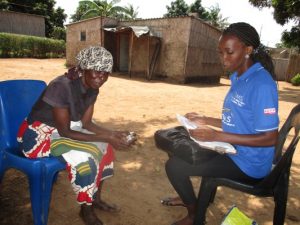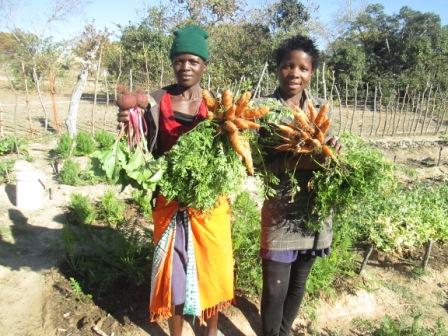
by dapp | Oct 29, 2018 | Blog, News
An economically empowered family positively impacts the lives of children especially young girls. In line with this statement Child Aid Zimbabwe through its first line of strengthening the economy of the family trains ,supports and empowers each family to increase its income through establishing income generating projects IGPs.
Research shows that girls in poor families have a higher chance of dropping out of school and pushed into early and forced marriages. The opposite is true in that when families are equipped with skills to establish and manage their income generating projects young girls will have equal access to nutrition, health and schooling opportunities
Families in the Child Aid projects organize themselves into Village Action Groups, that become the core of driving their IGPs that include nutrition gardens ,beekeeping, piggery, poultry, second hand clothing, sewing clubs and food outlets among other projects. Each Action Group consists of 30‐40 families who are organised together and meet every week for lessons and actions.
In the first half of 2018 Child Aid Zimbabwe achieved its aim of transforming families’ livelihoods so that they can be self-sufficient. The VAGs supported the revival of 33 group gardens soon after the rain season. A total of 3550 families were trained in the importance of having nutrition gardens for dietary diversity. Families responded positively and revived their household gardens and made sure that they had a minimum of 5 crop varieties.The gardens have become a source of income for families, such that they are able to meet their basic needs.
So far eighteen income-generating projects in agriculture, aquaculture, indigenous chicken, rabbits and horticulture were established with training and support from AGRITEX. The 3550 families from Rushinga, Bindura and Shamva districts were food secure.
Child Aid conducted 50 lessons on improving income and established 40 internal saving and lending clubs which are localized financial systems. Money from savings clubs have been used by families to engage in various income generating projects such as poultry and piggery. As a result of the income generating activities and ISALs, family financial positions have improved making it easy to pay school fees and caring for their families.
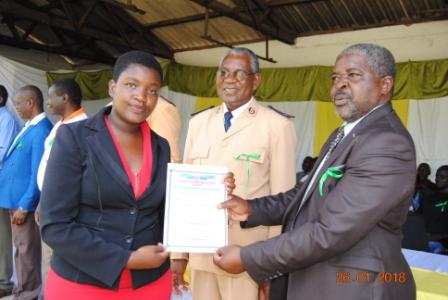
by dapp | Oct 25, 2018 | Blog, News
Youth unemployment remains a challenge in Sub Saharan Africa and is regarded as a key driver of poverty. In Zimbabwe the number of unemployed youths continues to grow due to a myriad of economic challenges that has seen industries and companies closing.
The fight against poverty remains at the heart of DAPP Zimbabwe programming. Through vocational training at Ponesai Vanhu Technical College youths are equipped with the necessary knowledge and practical skills necessary for them to earn a decent living and be a part of stimulating economic growth.
PVTC vocational training is well known for developing occupational competencies in the flagship courses in Motor Mechanics, Business studies and Brick and Block laying. The college also offers three months short courses in Brick and Block Laying, Catering, Garment Making and Beauty Therapy in response to the current economic changes that do make access to training difficult for many.
Ponesai Vanhu Technical College lives up to its name “Ponesai Vanhu” (Help People ) in ensuring that young Zimbabweans create sustainable self employment opportunities to overcome poverty and become contributors to the country’s economy. Due to its focus on careers based training for enterprise (TFE), Ponesai Vanhu Technical College equips individuals with innovative skills which enable them to set up their own businesses.
Ponesai Vanhu Technical College remains non-discriminatory in that it promotes quality vocational training for young women and girls. This is in line with the country’s gender equality drive to see equal access to opportunities. One of the girls said” We are being seen participating and thriving in traditionally male dominated fields such as motor mechanics”.
As we commemorate the International Day for the Eradication of Poverty, DAPP Zimbabwe calls on young people not to wait around for government to create jobs but to enroll in vocational institutions such as PVTC to liberate themselves from the effects of poverty.
Advantages of Vocational training
- Practical skills development of specialized occupations
- Lowers unemployment through increased self employment
- Skills development in passion areas
- Shorter training time
- Lower costs of education
- Improves self-esteem
Ponesai Vanhu Technical College, Shamva
Tel: 0783705216
Email: pvtc@gmail.com
DAPP: Tel: 042 497620

by dapp | Sep 5, 2018 | Blog, News
In 2016 DAPP Zimbabwe began a UNEP-10FYP financed program with 2000 farmers in Gutu and Mutasa districts to increase resilience to the negative effects of climate change. The initiative provides mentoring and training in climate resilient agricultural practices,market literacy and access to government support.
We are happy our project is featured on the One Planet Network which is the network of the 10 Year Framework of Programmes on Sustainable Consumption and Production
For more follow this link : http://www.oneplanetnetwork.org/initiative/sustainable-lifestyles-among-rural-families-zimbabwe-small-scale-conservation-farming

Climate smart solutions -Women farmers use low cost pumps to water their nutrition gardens

by dapp | Apr 10, 2018 | Blog, News
Farmers’ clubs Zimbabwe projects are engaging farmers in Masvingo ,Makoni, Mutasa in promoting the cultivation of small grains such as millet and sorghum to boost food security.
Farmers’ clubs Project Leaders agree that small grains such as sorghum, pearl and finger millet are vital for food and nutrition security. They says their drought tolerant nature make them able to thrive better in drier areas.
Farmers also received education on the benefits of growing small grains. They were taught that, sorghum and pearl millet are rich in potassium and calcium which are important for healthy bones and teeth while finger millet is rich in iron which is important for children under five years, pregnant women and the chronically ill patients.
Farmers welcomed the initiative and managed to produce a substantial amount of the small grains.
Following the good harvest Farmers were also educated on storage of the small grains discovering that as compared to maize Finger millet has long storage life and is rarely attacked by insects.
Ministry of Agriculture is on record saying that growing small grains is a proven approach for improving household food security.

by dapp | Apr 10, 2018 | Blog, News
DAPP Total Control of Tuberculosis is empowering every individual to fight TB and HIV through repeated mobilisation, information dissemination, education and basic counselling at their doorstep.
The program uses its unique strategy of mobilising people to know their HIV status, TB screening as well as collecting sputum from the door step to the lab and bringing the results back to the household. This strategy has reached many people who ordinarily would not actively seek out knowledge or treatment of TB.
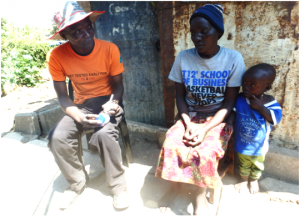
“When I visit the people at their door step, they are happy to disclose their health challenges and it becomes easier to assist them. This is because sometimes people might take time to decide to visit the clinics when they are not feeling well and in other instances if they are coughing they think of taking home remedies instead of visiting the clinic for TB screening in time, even though they know their HIV status” ,said Joseph the Field Officer.
Giving information, mobilising people for HIV testing, TB screening ,collecting sputum as well as giving feedback of the results is done at door step. Once someone presents with TB referal slips are given to visit the nearest health facility.
This main strategy is effective as compared to other strategies because enough time is taken with an individual to discuss confidential information. The beneficiary can easily decide and get immediate help and is directed to the right service providers by the Field Officer. The Field Officer and the community volunteers provide educative information on TB/HIV to people in the comfort of their homes.
They collect sputum samples and bring results to the doorstep/ In the case where an individual presents with TB the Field Officer offers support through monitoring treament through the Direct Observed Treatment (DOT).
Field Officers go further to form TRIOs for treatment adherence and monitoring.
In order to effectively deliver results and cover more ground the Field Officer join hands with trained community volunteers who go door to door step providig one on one counselling in order to identify health problems and refer to health service providers.
Results from the programme implementation can be quickly and easily tracked through the use of data standardized monitoring and evaluation data collection tools and analysed. Decisions are made quickly and actions are taken to control the TB and HIV.
No one is left behind when using the door to door strategy in the Makoni district and the nation at large.
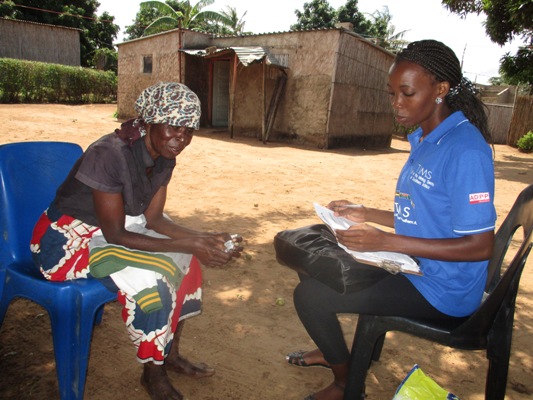
by dapp | Apr 10, 2018 | Blog, News
The major global health crises of recent decades have, at times, felt insurmountable. The onset of the HIV epidemic in the late 1970s and the 2014 West African Ebola outbreak are prime examples. Yet through concerted and sustained collaborative action, in significant part led by civil society and the affected communities, such crises have over time been addressed, controlled, and increasingly mitigated.
Tuberculosis is not one such crisis. While the number of deaths globally from tuberculosis fell by 22 percent between 2000 and 2015, TB is now responsible for more deaths than either HIV or malaria annually. In 2015, TB was one of the top 10 causes of death worldwide, with an estimated 10.4 million new cases across the globe. That’s roughly one new case for every 721 people on the planet.
What’s more, a rising number of these cases coincide with infection with the better-known global killer, HIV/AIDS, with incidence of co-infection directly linked to elevated mortality rates. In 2015, 1.8 million people died from TB, of which 0.4 million were also HIV positive.
Yet unlike AIDS, TB has to some extent slipped under the radar of global public awareness, receiving a mere fraction of the international efforts dedicated to combatting other major epidemics in the past 30 years. Greater political will, collaboration, and international leadership would all help to tackle TB, as would greater funding and research into new drug-resistant strains of TB and the complexities of co-infection. But, in the absence of a directed focus from the international community, TB prevention has fallen largely into the hands of the medical community, with little investment from either civil society or affected communities that will be critical in preventing the spread of the disease in the future.
These groups were, and remain, at the forefront of promoting sustainable approaches to health issues and pandemics across the world — most notably in relation to halting the seemingly exponential spread of HIV infection. The Federation Humana People to People, of which I am chair, developed and implemented the ground-breaking Total Control of the Epidemic across 12 countries, reaching more than 6.5 million people and acting as a model for HIV prevention efforts across the globe.
A similar approach is desperately needed to tackle the TB crisis. While greater global investment into research and treatment is essential, the factors preventing a greater reduction in global incidents of TB must be addressed at a more localized level. Stigma, mistrust, and false beliefs among affected populations can only be tackled through direct engagement, the development of trust and, crucially, tried and tested approaches to disease prevention in such communities.
The good news is we know how to do this. The success, albeit belatedly, in tackling the HIV epidemic, provides us with a replicable and scalable model. And there are clear indications that implementation of this model can deliver results.
Let’s take Mozambique as an example. Maputo-province and Maputo-city are among the highest HIV/TB burden regions in Mozambique with HIV prevalence in adults around 23 percent and 17 percent, respectively. Using the approach taken to tackle HIV as a model, ADPP Mozambique has been implementing two community-based projects in Maputo province, aiming to protect people living with HIV from TB and avoidable mortality.
The key elements of these programs are field counselors and supervisors, in collaboration with local public health facilities, and engaging with local communities door-to-door to build trust and understanding. The programs utilize local networks and knowledge to target households that are known to be at high risk of TB, screening individuals, and providing them with the appropriate health support mechanisms as required. The programs empower individuals to spread the message, and to act as a conduit for engaging other, often harder-to-reach individuals and communities. Crucially, the program uses a unique IT-based mobile application to track patients in the community and link them to their nearest health-facilities, facilitating follow-ups, monitoring, and wider data-driven community engagement strategies.
And it has shown impressive results. Between 2015-16, the projects in Maputo tested 247 342 people at high risk of HIV, of which 21 348 were identified as sero positive; 97.5 percent of those identified as HIV positive were also screened for TB, leading to 747 people being connected to TB treatment. This approach ensures that people know their status — of both HIV and TB — equipping them with the knowledge and the impetus to do something about it. The highly contagious nature of TB renders prevention an efficient investment — with every person treated for TB, you are directly contributing to preventing the spread of infection to other family and community members. The multiplier effect on investment, paired with the urgency of the epidemic, should be enough to propel this issue to center stage of the public health policy debate.
At the Moscow Ministerial Conference in November, and the U.N. high-level meeting in 2018, we will be advocating for firmer commitments from civil society, governments, and international institutions, and the widespread implementation of an accountability framework in TB prevention. We believe that staunch commitment, together with solid mechanisms for accountability, can put an end to this avoidable yet deadly illness.
Approaches involving meaningful community engagement, based on tried and tested methods and models and working collaboratively with affected communities, must be prioritized, funded, and replicated if we are to break the back of the TB epidemic. At-risk communities deserve an approach that empowers them, consults with them, and strengthens their ability to lead the fight against TB. We cannot afford another lost decade
